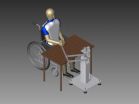(Press-News.org) Scientists from the Spanish National Cancer Research Centre (CNIO) in Madrid, along with British colleagues from the Institute for Cancer Research (ICR) and the Royal Marsden NHS Foundation Trust, have developed a test that studies genetic patterns in blood cells to detect advanced–stage prostate cancer. The results of the study are being published today in the journal The Lancet Oncology.
The study shows that gene patterns in blood cells act as a barcode and could be used together with the current PSA test to select those patients with the worst prognosis in need of immediate treatment.
Advanced stage prostate cancer is a very heterogeneous illness in its symptomatology and evolution. Some patients live with it for several years without showing any symptoms, whilst in other cases the tumour can be very aggressive and deadly. This heterogeneity highlights the need to develop reliable tests that discriminate between the different types of patients.
In this study, led by David Olmos from Málaga and Johann de Bono from ICR and The Royal Marsden, the researchers demonstrate that the signs prostate cancer leaves in the blood can be used to further understand the illness. David Olmos has just joined CNIO to set up the Prostate Cancer Clinical Research Unit.
The study described in the article consists of sampling the genetic changes in the patient's blood. These changes can be interpreted as barcodes to identify those patients who are going to suffer an aggressive form of the cancer. Using the results, doctors could adjust treatment to the specific profile of each patient.
In order to carry out the study, the scientists scanned all the genes in the blood samples of 100 patients with prostate cancer; 69 patients were suffering from an advanced stage of prostate cancer and 31 patients has a localised, low-risk tumour.
Using statistical models, the researchers split the patients into four groups that reflected the different genetic activity patterns—what we have described above as barcodes. After following the patients for approximately two-and-a-half years, the authors observed that one of these groups of patients had a much lower survival rate.
This group had a barcode that can be summed up as showing alterations in the activity of nine genes, and an alteration in the different functions of the immunological system, which suggests that the cancerous cells unleash an anomalous immune response as they multiply in the body.
The authors of the study confirmed these results with 70 additional patients from the Memorial Sloan Kettering Cancer Centre in New York who were also suffering from advanced stage prostate cancer. These results show that this nine-gene barcode can be useful and precise in identifying those patients with the worst prognosis.
"The test we have developed is simpler and potentially more precise than many other tests we currently have available or than carrying out another biopsy", say the researchers in their study.
The authors of this study plan to evaluate this new test in large-scale clinical trial that will analyse the efficiency of a new drug for treating prostate cancer. Other studies, led by CNIO researchers, will also analyse the utility of these blood tests in patients at early stages of the illness.
David Olmos, the study's lead researcher, joined CNIO last September to head CNIO's Prostate Cancer Clinical Research Unit. Olmos previously worked at the Institute for Cancer Research (ICR) and The Royal Marsden NHS Foundation Trust in London, where the study was carried out. David Olmos has made very important contributions to the study of prostate cancer, working with the development of new biomarkers for tracking the illness and the development of phase I, II and III clinical trials for new drugs, some of which have recently been approved for treating the illness.
###About CNIO's Prostate Cancer Clinical Research Unit
One of the first goals of CNIO's Prostate Cancer Clinical Research Unit, created in September 2012, is to bring a multi-disciplinary focus that brings together the work of molecular biologists, bioinformatics engineers and clinical oncologists. The creation of this new unit represents an investment by CNIO in improving the quality of life and survival of patients with the illness, which is the third cause of death among Spanish males, resulting in almost 6,000 fatalities each year. This multidisciplinary approach means to accelerate the translation of new knowledge generated at CNIO to clinical practitioners and the international scientific community so both healthcare professionals and patients with prostate cancer may further benefit.
This new unit is added to the five that already form part of CNIO's Clinical Research Programme, directed by Manuel Hidalgo, the Vice-President of Translational Research, in which clinical and basic researchers work together to discover new solutions for patients with tumours of the digestive system and breast cancer.
Reference article:
Prognostic value of blood mRNA expression signatures in castration-resistant prostate cancer: a prospective, two-stage study. David Olmos, Daniel Brewer, Jeremy Clark, Daniel C Danila, Chris Parker, Gerhardt Attard, Martin Fleischer, Alison H M Reid, Elena Castro, Shahneen K Sandhu, Lorraine Barwell, Nikhil Babu Oommen, Suzanne Carreira, Charles G Drake, Robert Jones, Colin S Cooper, Howard I Scher, Johann S de Bono. The Lancet Oncology (2012). doi: S1470-2045(12)70372-8
Scientists develop a blood test that detects aggressive prostate cancers
Spanish and British scientists design a precision blood test that uses blood cells to detect aggressive prostate cancer
2012-10-09
ELSE PRESS RELEASES FROM THIS DATE:
Liquorice offers clue to cleaner medical implants
2012-10-09
Oxford, October 8, 2012 - A nanotech material containing an extract from liquorice can be used to sterilize and protect medical devices and implants which include biological components, and protects these functional bio-components during the sterilization process.
Publishing their findings in the latest issue of Materials Today, a team of researchers from Germany and Austria explain how conventional sterilization techniques based on a blast of radiation, or exposure to toxic gas can damage the functional biological components of the device. The coating, containing a component ...
New methods might drastically reduce the costs of investigating polluted sites
2012-10-09
This press release is available in German.Ferrara/Leipzig. New methods might allow polluted sites to be investigated and monitored long term at significantly reduced costs. Authorities and those who have to remediate polluted sites in Europe might therefore be able to save costs and use these to treat other areas. This is the conclusion of the EU research project ModelPROBE, which was coordinated by the UFZ. The results, with which the scientists aimed to lower the workload of authorities and consultants, include a handbook detailing the methods for characterising contaminated ...
Worldwide patent for a Spanish stroke rehabilitation robot
2012-10-09
VIDEO:
This is about the worldwide patent for a Spanish stroke rehabilitation robot.
Click here for more information.
Robotherapist 3D, a robot which aids stroke patients' recovery, is to be brought to market by its worldwide patent holder, a spin-off company from the Miguel Hernández University of Elche (Alicante, Spain). It is the first robot to enable patients to start doing exercises while supine, allowing them to begin shortly after the stroke and expediting recovery. ...
River Thames invaded with foreign species
2012-10-09
Almost 100 freshwater species not native to the UK have invaded the River Thames catchment making it one of the most highly invaded freshwater systems in the world, according to scientists at Queen Mary, University of London.
The research, published in the journal Biological Invasions at the weekend, suggests that legislation to prevent the introduction of non-native species across the UK has been unsuccessful. The cost to the British economy of invasive non-native species is £1.7bn every year (CABI report, 2010).
Lead author, Dr Michelle Jackson* who undertook the ...
VIB concludes that Séralini study is not substantiated
2012-10-09
The scientific analysis in this document shows that the research design of Séralini et al. contained fundamental shortcomings that preclude any sensible conclusions from being drawn. In other words, the statements that Séralini made about the health effects of GMOs and Roundup were baseless. Moreover, the research shows signs of selective interpretation of the findings or a misleading representation of these, which is contrary to prevailing scientific ethical standards.
###View the entire analysis online: http://www.vib.be/en/news/Pages/VIB-concludes-that-Seralini-study-is-not-substantiated-.aspx
...
A system to automate traffic fines is designed
2012-10-09
This press release is available in Spanish. The goal of the scientists in the Information and Communications Technology Security Group (Seguridad de las Tecnologías de la Información y las Comunicaciones - SeTI) at UC3M who are working on the E-SAVE project is to use information technologies (ITs) to improve the enforcement of certain traffic regulations. Specifically, they propose a set of systems for the automated, immediate and telematic supervision and management of the administrative sanctioning process. The purpose is to reduce highway accidents, given that one of ...
Researchers develop new way to determine amount of charge remaining in battery
2012-10-09
Researchers from North Carolina State University have developed a new technique that allows users to better determine the amount of charge remaining in a battery in real time. That's good news for electric vehicle drivers, since it gives them a better idea of when their car may run out of juice.
The research is also good news for battery developers. "This improved accuracy will also give us additional insight into the dynamics of the battery, which we can use to develop techniques that will lead to more efficient battery management," says Dr. Mo-Yuen Chow, a professor ...
UC research finds small signs lead to big frustrations
2012-10-09
Signs that are too small or unclear to consumers seem to be a growing national issue, leading some business owners to lose potential customers, according to University of Cincinnati Marketing Professor James Kellaris.
"This persistent, growing national problem is frustrating for consumers and can lead to loss of business and, by extension, loss of tax revenue for the community," Kellaris said.
Kellaris, the James S. Womack/Gemini Chair of Signage and Visual Marketing in the UC Carl H. Lindner College of Business, will present this research during the October 10 -11 ...
Cause of annoyance, concern, anxiety, and even anger:
2012-10-09
To understand the effects of continuous computerized surveillance on individuals, a Finnish research group instrumented ten Finnish households with video cameras, microphones, and logging software for personal computers, wireless networks, smartphones, TVs, and DVDs. The twelve participants filled monthly questionnaires to report on stress levels and were interviewed at six and twelve months. The study was carried out by Helsinki Institute for Information Technology HIIT, a joint research institute of Aalto University and the University of Helsinki, Finland.
The results ...
Southampton researchers explain how pulsars slow down with age
2012-10-09
Researchers at the University of Southampton have developed a model which explains how the spin of a pulsar slows down as the star gets older.
A pulsar is a highly magnetised rotating neutron star which was formed from the remains of a supernova – an explosion which happens after a massive star runs out of nuclear fuel. A pulsar emits a rotating beam of electromagnetic radiation, rather like that of a lighthouse. This beam can be detected by powerful telescopes when it points towards and sweeps past the Earth.
Pulsars rotate at very stable speeds, but slow down as ...
LAST 30 PRESS RELEASES:
New knowledge on heritability paves the way for better treatment of people with chronic inflammatory bowel disease
Under the Lens: Microbiologists Nicola Holden and Gil Domingue weigh in on the raw milk debate
Science reveals why you can’t resist a snack – even when you’re full
Kidney cancer study finds belzutifan plus pembrolizumab post-surgery helps patients at high risk for relapse stay cancer-free longer
Alkali cation effects in electrochemical carbon dioxide reduction
Test platforms for charging wireless cars now fit on a bench
$3 million NIH grant funds national study of Medicare Advantage’s benefit expansion into social supports
Amplified Sciences achieves CAP accreditation for cutting-edge diagnostic lab
Fred Hutch announces 12 recipients of the annual Harold M. Weintraub Graduate Student Award
Native forest litter helps rebuild soil life in post-mining landscapes
Mountain soils in arid regions may emit more greenhouse gas as climate shifts, new study finds
Pairing biochar with other soil amendments could unlock stronger gains in soil health
Why do we get a skip in our step when we’re happy? Thank dopamine
UC Irvine scientists uncover cellular mechanism behind muscle repair
Platform to map living brain noninvasively takes next big step
Stress-testing the Cascadia Subduction Zone reveals variability that could impact how earthquakes spread
We may be underestimating the true carbon cost of northern wildfires
Blood test predicts which bladder cancer patients may safely skip surgery
Kennesaw State's Vijay Anand honored as National Academy of Inventors Senior Member
Recovery from whaling reveals the role of age in Humpback reproduction
Can the canny tick help prevent disease like MS and cancer?
Newcomer children show lower rates of emergency department use for non‑urgent conditions, study finds
Cognitive and neuropsychiatric function in former American football players
From trash to climate tech: rubber gloves find new life as carbon capturers materials
A step towards needed treatments for hantaviruses in new molecular map
Boys are more motivated, while girls are more compassionate?
Study identifies opposing roles for IL6 and IL6R in long-term mortality
AI accurately spots medical disorder from privacy-conscious hand images
Transient Pauli blocking for broadband ultrafast optical switching
Political polarization can spur CO2 emissions, stymie climate action
[Press-News.org] Scientists develop a blood test that detects aggressive prostate cancersSpanish and British scientists design a precision blood test that uses blood cells to detect aggressive prostate cancer


